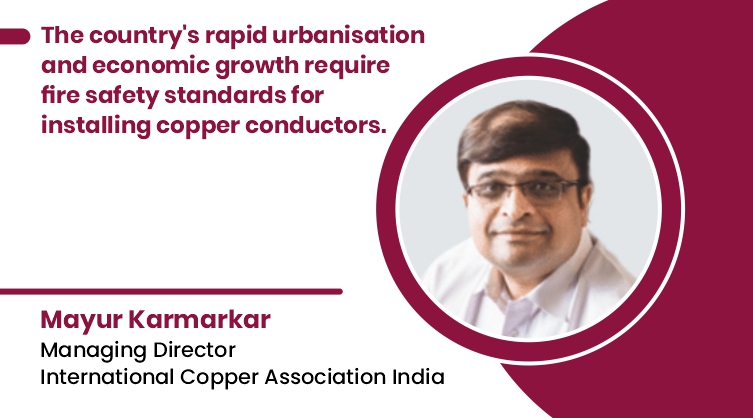Will we continue to react to the flames?
By EPR Magazine Editorial November 3, 2023 11:56 am IST
By EPR Magazine Editorial November 3, 2023 11:56 am IST

The country’s rapid urbanisation and economic growth require fire safety standards for installing copper conductors.
Rapid urbanisation and industrialisation drive India’s growth to become the third-largest economy by 2028 and a developed nation by 2047. However, this growth demands improved infrastructure and safety standards.
India’s urban population is expected to reach 675 million by 2035, requiring significant infrastructure enhancements. Urban migration strains existing infrastructure and utilities, necessitating strict safety regulations to prevent man-made disasters, particularly in densely populated cities.
Reported Fire Accidents
In 2021, India reported 8,491 fire accidents, causing 8,348 deaths, with 50.8% occurring in residential buildings. Electrical accidents caused 20% of these incidents in 2020. Fire fatalities accounted for 91% of the total affected people, underscoring the seriousness of the issue.
A recent fire at AIIMS Delhi disrupted services but resulted in no casualties, and its cause remains unknown. While fortunate, the ultimate goal should be preventing such accidents.
“Prevention is better than cure” is highly relevant in fire safety. Stringent safety protocols, careful planning, and proper infrastructure are more advantageous than relying solely on reactive firefighting and damage control measures.
Basic Regulations
As India’s urban expansion drives increased electrical usage in residential and commercial buildings, our current infrastructure often can’t handle the load, raising fire risks. Enforcing building codes is crucial to ensure structural integrity.
India’s National Building Code (NBC) regulates construction nationwide, covering fire safety, materials, structural design, and sustainability. It establishes basic regulations to safeguard public safety regarding structural integrity, fire risks, and construction-related health.
The NBC recommends using copper for internal building wiring due to its minimal risk. It’s safer to switch from aluminium to copper conductors when aluminium is beyond economical repair. Copper is the best non-precious metal conductor, meeting the NBC’s quality and conductivity standards. Compliance with the NBC is now mandatory through a revised safety regulation from the Central Electricity Authority (CEA). States have the authority to enforce these codes.Awareness of the use of Copper conductors
With awareness about mandates for these codes, fire safety is allotted a higher priority. It is critical to prevent fire accidents in the first place rather than taking reactive steps after the fire. There is an urgent need to rigorously enforce fire safety measures through mandatory NBC provisions, thus taking a preventive approach to fire accidents.
Copper is mainly used in conductors, control devices and power outlets. Copper’s unique electrical characteristics over other cheaper materials, its strength, high melting point, and corrosion resistance make it the best choice for safety in residential and commercial spaces. Copper conductors are also energy-efficient, reducing energy losses and lowering carbon emissions.
From a monetary perspective, copper systems may add an incremental cost of 0.5 percent to 1 percent to the total construction costs. However, they can avert a substantial risk to life and property due to fire accidents.
Given the rapid urbanisation globally, examining the safety protocols implemented by other countries is beneficial. Singapore has mandated the use of only copper conductors for installations, whether wholly or partially, for domestic purposes while prohibiting the use of aluminium conductors. Similarly, Qatar and Abu Dhabi have also mandated using copper conductors in cables.
By drawing inspiration from international examples and embracing copper’s safety benefits, India can tread a path towards sustainable urban growth, ensuring economic prosperity and the safety and well-being of its citizens for generations to come.
In the face of India’s soaring economic prosperity, one question resonates: Will we choose to prevent fire accidents before they ignite, or will we continue to react to the flames?
Spokesperson- Mayur Karmarkar, Managing Director, International Copper Association, India
We use cookies to personalize your experience. By continuing to visit this website you agree to our Terms & Conditions, Privacy Policy and Cookie Policy.